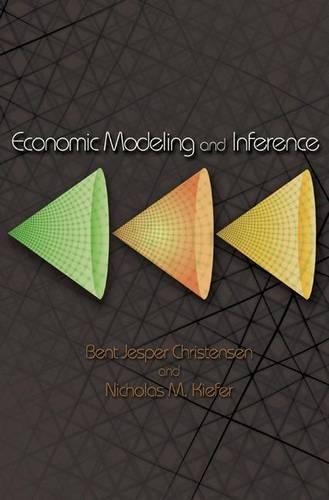
Economic Modeling and Inference
(Hardback)
Publishing Details
Economic Modeling and Inference
By (Author) Bent Jesper Christensen
By (author) Nicholas M. Kiefer
Princeton University Press
Princeton University Press
23rd June 2009
United States
Classifications
Tertiary Education
Non Fiction
330.015118
Physical Properties
Hardback
488
Width 152mm, Height 235mm
794g
Description
Economic Modeling and Inference takes econometrics to a new level by demonstrating how to combine modern economic theory with the latest statistical inference methods to get the most out of economic data. This graduate-level textbook draws applications from both microeconomics and macroeconomics, paying special attention to financial and labor economics, with an emphasis throughout on what observations can tell us about stochastic dynamic models of rational optimizing behavior and equilibrium. Bent Jesper Christensen and Nicholas Kiefer show how parameters often thought estimable in applications are not identified even in simple dynamic programming models, and they investigate the roles of extensions, including measurement error, imperfect control, and random utility shocks for inference. When all implications of optimization and equilibrium are imposed in the empirical procedures, the resulting estimation problems are often nonstandard, with the estimators exhibiting nonregular asymptotic behavior such as short-ranked covariance, superconsistency, and non-Gaussianity. Christensen and Kiefer explore these properties in detail, covering areas including job search models of the labor market, asset pricing, option pricing, marketing, and retirement planning. Ideal for researchers and practitioners as well as students, Economic Modeling and Inference uses real-world data to illustrate how to derive the best results using a combination of theory and cutting-edge econometric techniques. * Covers identification and estimation of dynamic programming models * Treats sources of error--measurement error, random utility, and imperfect control * Features financial applications including asset pricing, option pricing, and optimal hedging * Describes labor applications including job search, equilibrium search, and retirement * Illustrates the wide applicability of the approach using micro, macro, and marketing examples
Reviews
"Economic Modeling and Inference gives an excellent overview of dynamic modeling techniques in economics and fills an important gap among current textbooks. [It] is an excellent book, especially for graduate students in economics... [I]t is also a must for economists who need a refresher course in dynamic modeling ... [and] should also be on the bookshelf of practicing researchers interested in expanding the number of models used in their work."--Journal of the American Statistical Association "Economic Modeling and Inference offers a technically sophisticated grounding in the structural approach to analyzing data. The book does an excellent job of illustrating the wide range of questions that the empirical dynamic programming approach can tackle by explicitly bridging economic theory and econometrics... Books such as these will undoubtedly help the structural paradigm more successfully compete in the market for applied econometric methodologies."--Robert M. Sauer, Journal of Economic Literature
Author Bio
Bent Jesper Christensen is professor of economics and management at the University of Aarhus in Denmark. Nicholas M. Kiefer is the Ta-Chung Liu Professor in Economics and Statistical Science at Cornell University.
